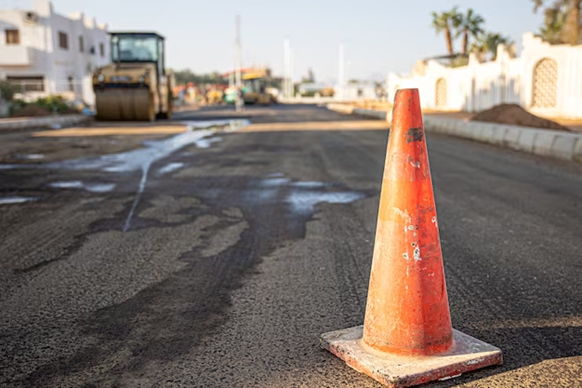Road and Highway Maintenance
PHILLY-TECH’s road and highway maintenance program involves preserving and maintaining infrastructures and roadways in their original condition. At PHILLY-TECH, students will learn about road, highways maintenance bridges and repairs.
PHILLY-TECH’s students will learn the difference between highways, bridges and roads as well as the different materials used for each roadway. Students will learn different structure designs, their functions and the environmental impacts.
Our program is designed to provide students with the knowledge and skills required to maintain and repair roads and highways. Throughout the program, students will also receive training in soft skills such as communication, teamwork, and leadership.
The curriculum will be regularly updated to keep up with evolving road and highway maintenance practices and industry standards. Graduates of this program will be well-prepared for careers in road and highway maintenance, ensuring safe and efficient transportation networks.

Diploma in Road and Highway Maintenance Technician Program
Duration: 2 years (4 Trimesters).
Prerequisites: High school diploma or equivalent.
RHMAINT 100: Introduction to Road and Highway Maintenance
- Overview of road and highway maintenance
- Historical development of road infrastructure
- The role of road and highway maintenance technicians
RHSAF 100: Occupational Safety
- Workplace safety regulations and practices in road maintenance
- Personal protective equipment (PPE)
- Recognizing and avoiding hazards in road and highway work
ROCONS 100: Basic Road Construction
- Road construction materials and equipment
- Road layout and markings
- Excavation and grading techniques
DRAINS 100: Drainage Systems
- Principles of road drainage
- Culverts and stormwater management
- Erosion control and environmental considerations
PAVMAINT 100: Pavement Maintenance
- Asphalt and concrete pavement types
- Repairing potholes and cracks
- Pavement resurfacing and overlays
BSMAINT 100: Bridge and Structure Maintenance
- Maintenance of bridges and elevated structures
- Inspections and structural integrity
- Painting and corrosion prevention
TRAFCS 100: Traffic Control and Safety
- Work zone traffic control
- Roadside safety and barrier systems
- Signage and pavement markings
WTMAINT 100: Winter Maintenance
- Snow and ice removal techniques
- Winter road maintenance equipment
- De-icing and sanding procedures
ROSTR 100: Road Surface Treatments
- Chip sealing and other road surface treatments.
- Seal coating and rejuvenation.
- Techniques for preserving road surfaces.
ENVIMP 100: Environmental Impact Assessment
- Environmental regulations and considerations
- Environmental assessments and mitigation measures
- Sustainable road maintenance practices
HEQOP 100: Heavy Equipment Operation
- Operation of road maintenance equipment (graders, rollers, loaders)
- Equipment safety and maintenance
- Equipment selection for specific tasks
RRREHA 100: Roadway Repairs and Rehabilitation
- Rehabilitation of damaged roadways
- Reconstruction and upgrading of roads
- Asset management and road network planning
PROMB 100: Project Management and Budgeting
- Project planning and scheduling for road maintenance
- Budgeting and cost estimation for maintenance projects
- Project documentation and management
CONSIT 100: Construction Site Supervision
- Supervising road maintenance projects
- Managing a maintenance crew
- Safety and quality assurance on construction sites
RHFIELD 100: Practical Training and Fieldwork
- Hands-on experience in road and highway maintenance
- Real-world maintenance projects and tasks
- Final assessment and evaluation of practical skills
RHTES 100: Final Assessment and Certification
- Completion of a road maintenance project
- Final assessment and evaluation of skills
Successful completion of the program leads to the award of the Diploma in Road and Highway Maintenance Technician
Students have to contact the school administration if they want to take extra credits or transfer credits to pursue the Diploma Certificate or Associate of Applied Science (A.A.S.) Degree in their field of interest. Students will select required number courses in each of the areas listed to meet general education requirements graduation for the A.A.S. Some of these courses can be transferred directly from and to the university system and may be substituted for recommended courses on the outline. Students should speak with an advisor before doing so these selective courses are required for all students.
- Selected Communication Course (Choose two for Diploma or three for the Associate)
ENGL 100: Fundamentals of Speech
CPL 100: Career Planning
CPL 101: Communications and Career Strategies
ENGL 101: Composition
ENGL 102: composition
- Selected Mathematics Course (Choose two for Diploma or three for the Associate)
MATH 100:General Math
MATH 101:Intermediate Algebra
MATH 102:College Algebra
- Selected Social Science Course (Choose two for Diploma or four for the Associate)
ECON 105:Leadership
ECON 101:Principles of Microeconomics I
ECON 102:Principles of Macroeconomics II
SOC 101:Introduction to Sociology
PSYC 101: Introduction to Psychology
HIST 101: History
